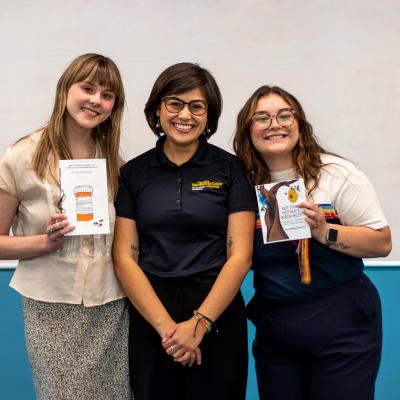As Kelsey Roberts and Ava Rice wrapped up their undergraduate degrees, they concluded their LGBT studies undergraduate certificates with ‘Zines’-- a form of print and/or digital media that is a truncated magazine, and draws inspiration from the feminist riot grrrl movement in the 1990s. ‘Zines include images and text with the intent to educate or display current socio-political topics and art.. As they both advocate for LGBTQ+ communities, they are also both students of the School of Social Transformation.
During their final presentations at the 2023 LGBT studies undergraduate capstone event, they shared their ‘Zines and went over key research points to help corroborate their studies. Beginning with Kelsey’s Zine, titled Not Your Mother’s Birds and Bees: Radical Queer Sex Education, she began by coining key terms and history about sex education in the United States.
“As part of her undergraduate honors thesis in Barrett, the Honors College, Kelsey conducted primary research about the ASU community needs for sexual health and sexual violence prevention education. A guiding research question and important principle Kelsey wanted to incorporate in her final product, a sex education ‘Zine, aimed to best understand representation and advocacy for marginalized communities, including the LGBTQ+ community. By surveying and affirming different experiences, representing queer people and relationships, and discussing issues relevant to the LGBTQ+ community, Kelsey aimed to advocate for all by adopting a "margin to center" approach to queer education.”
Her research dated back to the early 1900s when the first form of birth control was created– for uses quite different as compared to today’s society. During this era, eugenics were practiced with birth control– a form of “racial improvement” and “planned breeding”.
Following her brief overview of significant events in reproductive justice history in the United States, she broke up sex education and the organization of her ‘Zine into three categories: pleasure, relationships, and testing. Her goal in these chapters was to help break the stigma behind sex. From her surveys and conversations, many students were encouraged to stay abstinent and were not given proper education from their high school’s health courses. And while there are many outcomes for this lack of knowledge, Kelsey stated that 26.4% of female and 6.8% of male undergraduate students have experienced sexual assault. Is this lack of knowledge contributing to the numbers that we continue to see? She then discussed the importance of finding empowerment, rather than embarrassment, in pleasure, in relationships, and STI testing– all very important aspects of sex education that are left out in many curriculums.
To coincide with Kelsey’s presentation, Ava discussed the issues with heteronormativity in her presentation Down with Heteronormativity: Dismantling Prescribed Sexuality. She too began with key terms and historical moments in the queer community. Heteronormativity means “a theoretical term that refers to the compulsive and assumed notion that everyone is heterosexual and this is what is natural.” Ava’s ‘Zine “seeks to dismantle compulsive heteronormativity by highlighting evidence that proves a system of prescribed heterosexuality is not realistic or sustainable.”
From her conversations with other individuals in the LGBTQ+ community, she often came upon the question of “why don’t straight people have to “come out”?” In correlation with heteronormativity in our everyday lives, it is often represented in forms of media. While we have progressed quite a bit in today’s society, previous media and films would often represent the queer community as the villain or the problematic character.
A common issue that Ana brought up is that many individuals consider LGBTQ+ as a new movement, as if it has not been around for decades, if not centuries. While colonialism continues to push heteronormativity, historians have shown that many indigenous tribes have been going against gender roles that our modern world has instilled in us– more than 150 tribes, to give a number. She then challenged the audience to examine themselves and pay attention to compulsory heterosexuality in their own lives and asked the audience to educate others about heteronormativity to help make change.
While Ava and Kelsey will continue to advocate for the LGBTQ+ community, they both plan to continue their education in hopes to help represent the community on a grander scale. They wrapped up their undergraduate degrees and presentations with a faculty request to pass on their Zines for future students to examine, in which they both happily obliged.
